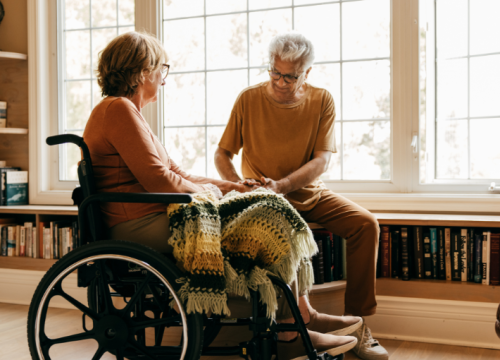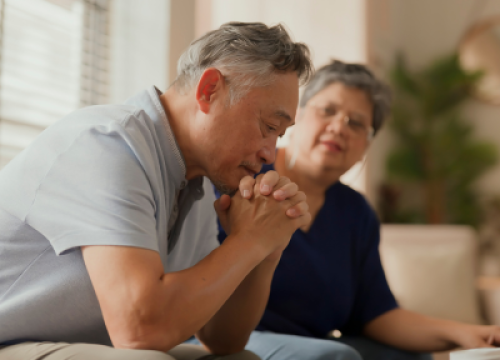We Answer the Most Frequently Asked Helpline Questions

In support of the one million people in the U.S. living with Parkinson’s disease (PD) and the hundreds of thousands of care partners, the Parkinson's Foundation provides an invaluable resource, our bilingual Helpline. Anyone in the PD community can contact our Helpline at 1-800-4PD-INFO (473-4636) or Helpline@Parkinson.org Monday through Friday from 9 a.m. to 7 p.m. ET.
The Parkinson’s Foundation Helpline:
- Answers questions about Parkinson’s disease symptoms, treatment options and research
- Provides referrals to local, in-person, and virtual resources like support groups, exercise classes, and health professionals with training in PD
- Helps care partners learn about care options and caregiver resources
- Guides callers to relevant educational resources like our publications, webinars and podcasts
We recently asked the trained Parkinson's information specialists who answer Helpline calls and emails to share the answers to the most frequently asked questions.
Q: Can you refer a Parkinson’s specialist, exercise class and support group?
A: Yes. The Helpline can provide names of Parkinson’s movement disorder specialists, neurologists and other Parkinson’s specialists — like a physical therapists, occupational therapists, speech therapists and more — in your area. Helpline specialists can also research information about nearby and virtual exercise classes and support groups.
Q: Is there a special diet that can help with my Parkinson’s?
A: A balanced, nutritious diet is important in Parkinson’s. The best plan is to maintain a varied diet with all the daily nutritional requirements — try to eat lots of fruits and vegetables, lean proteins and whole grains. Many doctors recommend the Mediterranean diet for its ability to help reduce blood pressure and cardiovascular disease. Also, try to drink plenty of water to help with constipation.
Q: My family member told me about a vitamin/supplement/tea that can relieve PD symptoms. Does it work?
A: Many people add vitamins and other nutrients to their treatment regimen, incorporating antioxidants such as vitamin B6, vitamin E, vitamin C, Coenzyme Q10, glutathione, in the hope of slowing the disease. None of these supplemental interventions have been shown to be effective in treating Parkinson’s or slowing disease progression. Be wary of new supplements that claim to cure multiple symptoms or diseases, as they often lack rigorous testing.
Q: Should I not eat protein when I take carbidopa/levodopa (brand name Sinemet)?
A: Most people who are newly diagnosed will not have a problem with a carbidopa/levodopa-protein interference. For some, particularly those living with PD for many years, eating protein-rich foods may reduce or decrease the effectiveness of levodopa. Most people who have trouble with Parkinson’s related to a diet high in protein report that their medications are not working. Levodopa works best when taken on an empty stomach. Taking it 30 to 45 minutes before eating can optimize its effectiveness. Talk to your doctor if you notice any changes in the effectiveness of your medications.
Q: My loved one has become confused and disoriented. Is this part of PD?
A: While cognitive changes can be a common non-motor PD symptom, the symptoms you are observing may not necessarily be caused by PD. Cognitive changes can also be related to depression or sleep disorders. In some cases, confusion and disorientation result from “delirium,” which is a temporary condition in which symptoms are caused by infection or other underlying conditions. Any sudden cognitive change should be reported to the doctor for an accurate diagnosis.
Q: As the primary caregiver, I often feel overwhelmed and unable to keep up with my own needs. What should I do?
A: Reach out for support or ask for help. Up to 70 percent of caregivers are significantly stressed and half meet the criteria for clinical depression. Take immediate action when you find you are ignoring your own needs, feel isolated, experience anxiety, resentment, demoralization or depression. Try to alleviate caregiver stress by recruiting friends and family or hiring a paid caregiver to help with care. Don’t wait, and get help managing caregiver-related anxiety, stress or depression by seeing a psychologist or therapist. Remember that you need to take care of yourself to be well enough to take care of your loved one. For more information, check out these Caregiver Resources.
Q: Is there financial assistance available for people with Parkinson’s?
A: While the Foundation does not provide financial assistance to individuals, Helpline specialists provide referrals to organizations that may be able to help with financial assistance for medication, transportation, basic needs and respite or nursing home care. A good place to start is to locate your nearest Area Agency on Aging office through the Eldercare Locator Service for help finding financial aid and related programs, like the Patient Access Network (PAN) Foundation assistance program.
Q: What other therapies can help with my Parkinson’s symptoms?
A: A comprehensive and multi-disciplinary approach to health care can be beneficial at any stage of Parkinson’s. Building a healthcare team involves taking advantage of not only the expertise of a PD specialist, but the help of a physical therapist, occupational therapist, speech therapist, nutritionist, social worker and others. Some may be able to find all of these professionals in one practice or center, but many will have to explore their community’s resources.
If you have a question that is not listed above, please call our Helpline! While we are happy to discuss any issue, calling our Helpline is not a substitute for seeing a doctor.
No one should have to face Parkinson’s alone. Contact the Parkinson’s Foundation Helpline at 1-800-4PD-INFO (473-4636) or Helpline@Parkinson.org with your Parkinson’s questions or join our PD Conversations online community.
Related Blog Posts

3 Essential Resources for 3 Different Kinds of Care Partners

Advanced Parkinson’s Care: Practical Ways to Help Your Loved One
